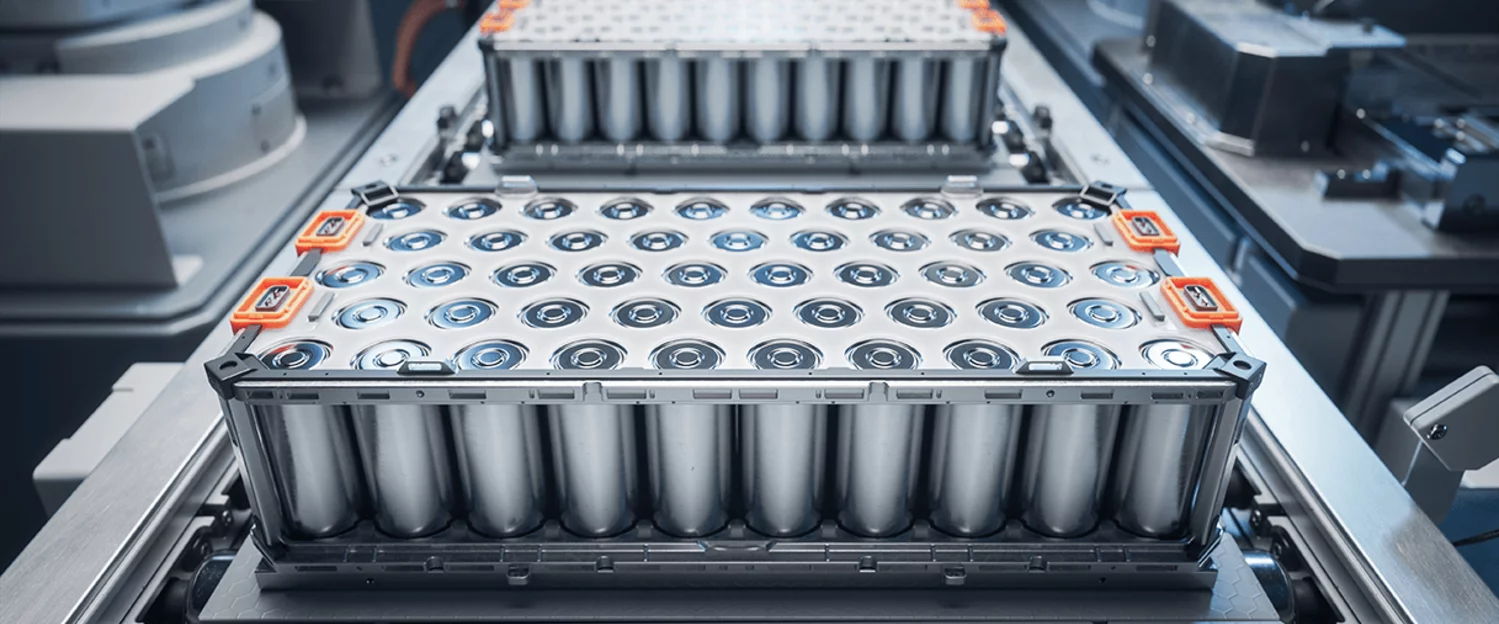The production of lithium-ion batteries and other high-performance batteries requires pure, extremely dry air. Providing this is a tremendously energy-intensive process. Existing dehumidification solutions are heavy consumers of electricity and drive up costs. The QueEn project, funded by the German Federal Ministry of Research and Technology [Bundesministerium für Bildung und Forschung - BMBF], therefore develops new solutions for the energy-efficient and economical production of lithium-ion batteries. To this end, research is being conducted into the use of process-oriented mini-environments instead of large dry rooms. Weiss Klimatechnik provides the innovative air management.
QueEn project makes battery cell production more energy-efficient
The Que-En project brings together leading companies and research institutions. In addition to Weiss Klimatechnik, the consortium includes the Fraunhofer Research Institution for Battery Cell Production (FFB), systems manufacturer FFT Produktionssysteme, Fraunhofer IPA and battery manufacturer Varta. The abbreviation QueEn stands for “Quality-oriented and energy-reduced plant technology for LIB- and NextGen-production in mini-environments”. The aim of the project is to make battery cell production more economical and environmentally friendly by means of innovative air-conditioning concepts in order to strengthen the competitiveness of German and European battery cell production compared to other international production sites.
Low dew point is a challenge for air-conditioning technology
The production of lithium-ion batteries requires extremely dry ambient air. “The materials used in high-performance batteries are particularly sensitive to moisture. Even small amounts of water can form highly reactive and toxic substances such as hydrofluoric acid”, says Martha Willmot, Weiss Klimatechnik project manager for QueEn, explaining the challenges involved in dry and cleanroom technology. Up to now, lithium-ion batteries have been produced in large dry rooms with correspondingly large volumes of air. Enormous amounts of energy are required to achieve the required dryness with a dew point of -40°C. New materials for cathodes and electrolytes will enable higher energy density in the future and will probably even require a dew point of as low as -60 °C. “This is enormously energy-intensive, very expensive and bad for the environmental balance”, says Willmot. This means that, in view of the high energy prices, battery cell production in Europe is currently not competitive compared to Asian manufacturers.
Up to 77% energy saved with mini-environments
Instead of large cleanrooms and dry rooms, the QueEn project partners rely on the use of energy-efficient mini-environments in a fully interlinked process with fully automatic airlocks. Compact, closed and locally limited clean-air areas are created from cleanrooms to class ISO 6 sterile rooms, in which the low-particle, dry air with a dew point of -60 °C is directed specifically to the point of use, while moderate climatic conditions are sufficient in the production hall. According to initial calculations, concentrating on mini-environments can reduce energy consumption in the production of Li-ion batteries by up to 77%.
Experience with air-conditioning and battery production in demand
Weiss Klimatechnik is responsible in the QueEn project for the provision of dry, temperature-controlled and low-particle air, among other things for electrolyte filling in extremely compact mini-environments. “This is the leading factor in battery cell production and in the project”, explains Martha Willmot. As a technology leader, the cleanroom specialist is also developing the central air management system for the mini-environments on the basis of its experience in semiconductor production. Technologically, the proven adsorption drying process is used to ensure the extremely low dew points. Thanks to optimised control technology and intelligent pressure regulation, the air can be conditioned with pinpoint accuracy. Sensors measure the air quality directly at the process points and enable fast and precise readjustment even during the ongoing production process.
Optimal protection for people, product and process
Aside from the enormous energy savings, mini-environments offer other advantages for safe, high-quality battery cell production. The separate, clean production environment not only creates the appropriate dry air conditions, but also protects the battery cells to be manufactured and the manufacturing process from other disturbing influences such as particles or moisture input by humans. This prevents unwanted reactions and accidents, from the formation of toxic gases to short circuits and fires. Mini-environments also improve the protection and working conditions of plant operators. They can work in production halls with a normal, comfortable humidity and are protected against escaping gases and acids by special measures in the event of any malfunctions at the point of use.
Successful proof-of-concept
The QueEn project is on a promising path in the implementation of the mini-environments. Weiss Klimatechnik has already conducted the proof-of-concept testing. Two prototypes will be delivered to the Fraunhofer Institute at the end of the year and put into operation in a large-scale demonstrator. Further optimisations will be carried out before completion of the project in 2026. Martha Willmot expects that some of the solutions developed can even be patented. The QueEn project demonstrates how Europe as a business location can be strengthened and sustainably positioned in the long term through the cooperation of research institutions and industrial partners.

